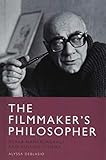The Filmmaker’s Philosopher : Merab Mamardashvili and Russian Cinema / Alyssa DeBlasio.
Material type: TextPublisher: Edinburgh : Edinburgh University Press, [2022]Copyright date: ©2019Description: 1 online resource (216 p.) : 14 B/W illustrationsContent type:
TextPublisher: Edinburgh : Edinburgh University Press, [2022]Copyright date: ©2019Description: 1 online resource (216 p.) : 14 B/W illustrationsContent type: - 9781474444484
- 9781474444507
- 791.430947 23
- online - DeGruyter
| Item type | Current library | Call number | URL | Status | Notes | Barcode | |
|---|---|---|---|---|---|---|---|
 eBook
eBook
|
Biblioteca "Angelicum" Pont. Univ. S.Tommaso d'Aquino Nuvola online | online - DeGruyter (Browse shelf(Opens below)) | Online access | Not for loan (Accesso limitato) | Accesso per gli utenti autorizzati / Access for authorized users | (dgr)9781474444507 |
Browsing Biblioteca "Angelicum" Pont. Univ. S.Tommaso d'Aquino shelves, Shelving location: Nuvola online Close shelf browser (Hides shelf browser)
Frontmatter -- Contents -- List of Figures -- Acknowledgments -- Note on Transliteration and Translation -- Introduction: The Freest Man in the USSR -- 1. Alexander Sokurov’s Demoted (1980): Consciousness as Celebration -- 2. Ivan Dykhovichnyi’s The Black Monk (1988): Madness, Chekhov, and the Chimera of Idleness -- 3. Dmitry Mamuliya’s Another Sky (2010): The Language of Consciousness -- 4. Alexei Balabanov’s The Castle (1994) and Me Too (2012): Kafka, the Absurd, and the Death of Form -- 5. Alexander Zeldovich’s Target (2011): Tolstoy and Mamardashvili on the Infinite and the Earthly -- 6. Vadim Abdrashitov and Alexander Mindadze’s The Train Stopped (1982): Film as a Metaphor for Consciousness -- Conclusion: Andrey Zvyagintsev’s Loveless (2017): The Philosophical Image and the Possibilities of Film -- Appendix -- Bibliography -- Index
restricted access online access with authorization star
http://purl.org/coar/access_right/c_16ec
Traces the influence of Soviet philosopher Merab Mamardashvili on a generation of Soviet and Russian filmmakersShortlisted for the 2020 AATSEEL Best Book in Cultural Studies awardThe first study of Mamardashvili’s significant influence on cinema, culture and philosophy in RussiaOffers a compelling analysis of contemporary Russian filmmakers, including Alexander Sokurov, Andrey Zvyagintsev and Alexei BalabanovProvides a carefully researched study of Mamardashvili’s philosophy and intellectual biography, written for scholars from all disciplinesKnown as the ‘Georgian Socrates’ of Soviet philosophy, Merab Mamardashvili was a defining personality of the late-Soviet intelligentsia. In the 1970s and 1980s, he taught required courses in philosophy at Russia’s two leading film schools, helping to educate a generation of internationally prolific directors. Exploring Mamardashvili’s extensive philosophical output, as well as a range of recent Russian films, Alyssa DeBlasio reveals the intellectual affinities amongst directors of the Mamardashvili generation – including Alexander Sokurov, Andrey Zvyagintsev and Alexei Balabanov. This multidisciplinary study offers an innovative way to think about film, philosophy and the philosophical potential of the moving image. "
Mode of access: Internet via World Wide Web.
In English.
Description based on online resource; title from PDF title page (publisher's Web site, viewed 29. Jul 2022)









